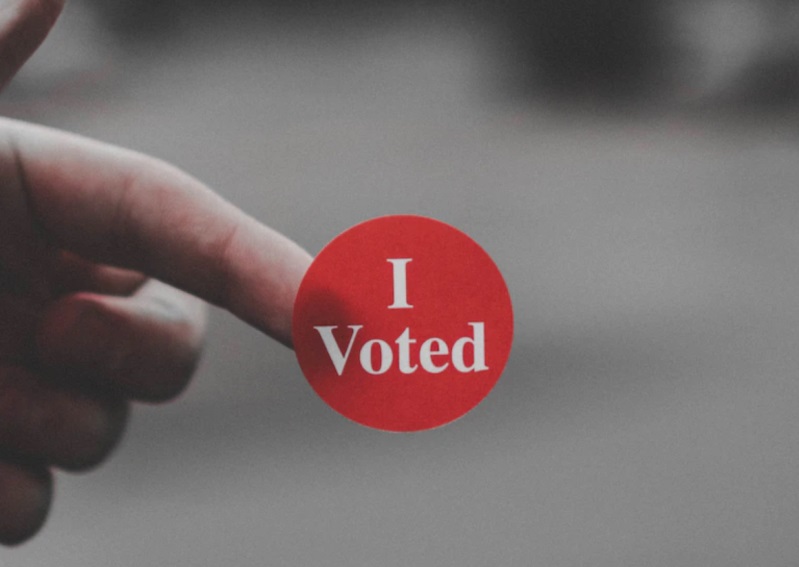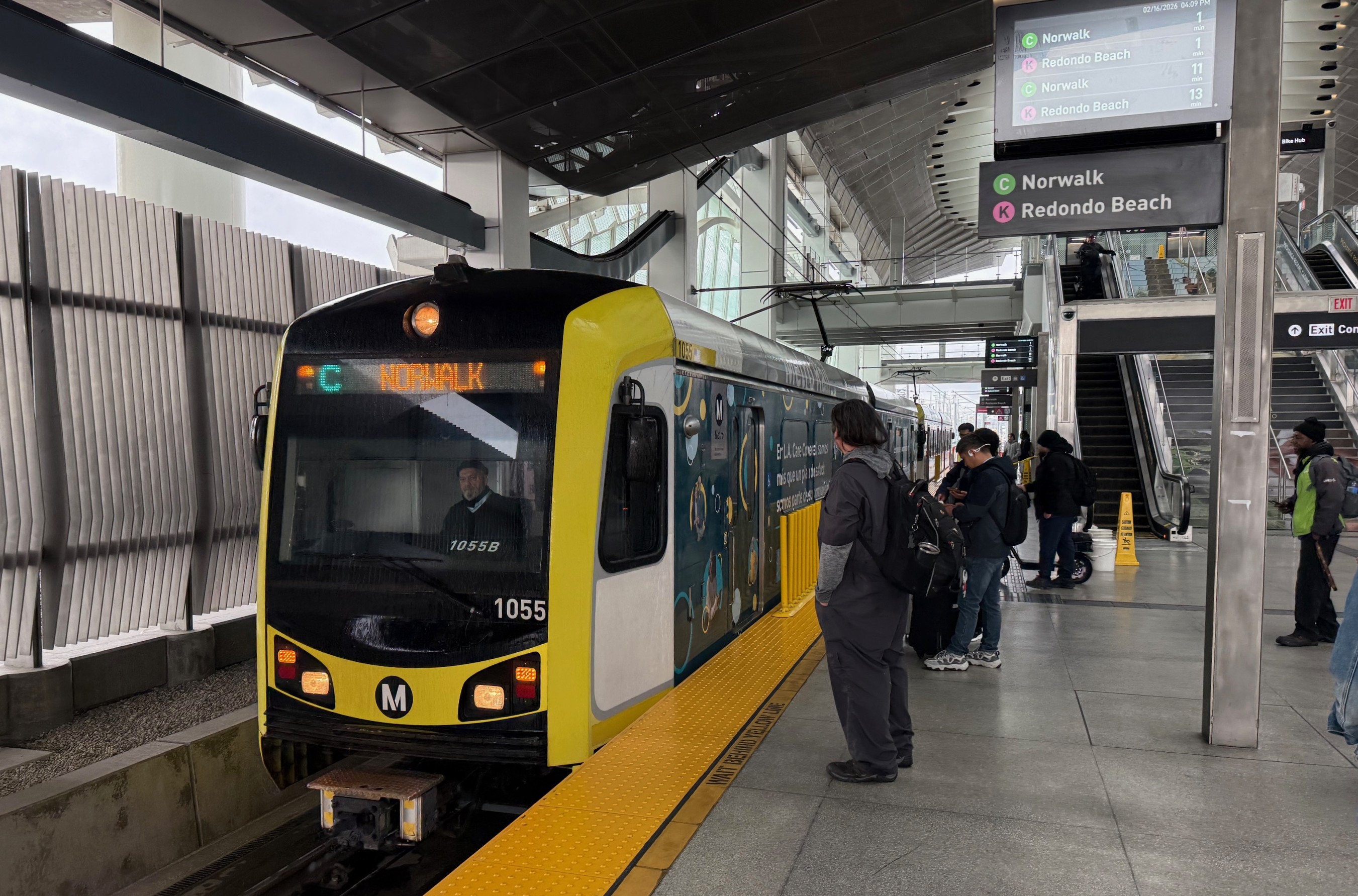Sustainable transportation is on Tuesday's ballot in communities across America — and advocates say that several of the most important aspects our federal transportation future may hang in the balance, too.
At the midterms, proponents of biking, walking and transit will be watching a handful of hotly contested races, including ballot measures that could help determine the transportation future of major regions as well as individual candidates who could make or break the movement's national priorities. And some of those races may find advocates rooting not just for the most visibly climate-conscious candidates, but for moderates on both sides of the aisle who support green modes.
"We know from our experience this past year that in order to pass major transportation legislation, it's important to think about our supporters on both sides," said Caron Whitaker, deputy executive director for the League of American Bicyclists. "When we lose the moderates in Congress, we often lose support we need. That's what we saw happen in 2010 and even 2012, which made it hard for some of the issues we care about to remain bipartisan."
Whitaker says loss of bipartisan support could be particularly crucial in light of the ongoing appropriations process, during which lawmakers have yet to formally fund the Active Transportation Infrastructure Investment Program created under the Bipartisan Infrastructure Law, which could funnel $500 million per year to communities to build trails, bike lanes, sidewalks and more. If that happens, the new program will likely inspire cities to match those federal dollars and jumpstart their green mobility future.
Other programs in the BIL that weren't subject to the appropriations process are already inspiring similar moves locally and regionally, and many of them are up for a vote on Nov. 8. According to a tracker from APTA's Center for Transportation Excellence, a whopping 19 transit-related ballot measures will be decided tomorrow.
"With the passage of the BIL, public transit advocates at the state and local level have a much stronger partner in the federal government than they have had in previous years," said Josh Cohen, the Center's executive director. "So we are seeing a flurry of activity from small, medium, and large-sized communities who recognize that public transit has almost always passed overwhelmingly at the ballot box, and who recognize the opportunity that these federal matches present."
Here are some of the key races to keep an eye on tomorrow, as well as a few thoughts on how the U.S.'s broader transportation future might shift as a result.
House and Senate
- Several members of the House who have been reliable supporters of active transportation initiatives find themselves in close congressional races, including Julia Brownley (D-Calif.); Sharice Davids (D-Kan.); Tom Malinowski (D-N.J.); Chris Pappas (D - N.H.); and Dina Titus (D- Nev.).
- The House Transportation and Infrastructure Committee is poised to experience some significant shake-ups if the Republicans regain the majority, in which case ranking member Sam Graves (R-Mo.) is expected to become chair. That shift may be particularly impactful if the moderate-leaning Republicans who the committee recently lost — including Don Young (R-Alaska), who died in March, and Rodney Davis (R-Ill.), who lost a primary following redistricting — aren't replaced by members of the GOP who are equally sympathetic towards sustainable transportation initiatives.
- On the House Energy Committee, the retirement of Bobby Rush (D-Ill.) is making some wonder who will take the lead on issues of biking and walking safety in his absence, particularly for the Black and brown communities who Rush was known for championing.
- Several close Senate races are drawing attention, including the re-election of Energy and Natural Resources Committee member Mark Kelly (D-Ariz.); Catherine Cortez Masto (D-Nev.), who's also on the Energy Committee; and Rev. Raphael Warnock (D-Ga.) on Banking, Housing and Urban Development, which can be particularly consequential for transit. Warnock is facing Herschel Walker.
- Advocates are also watching the partisan balance of the House and Senate on the whole. Following the passage of the Bipartisan Infrastructure Law, several unsympathetic lawmakers have introduced amendments aimed at defunding transit, electric vehicle charging programs, and even the Office of Civil Rights, and one amendment to strike the DOT's new Equity Action Plan even made it all the way the floor. None has passed, but some worry that if the amendments resurface, they could face a stronger chance of passing should the balance of power shift away from transit supporters.
Local transit measures
- Denver voters have the chance to approve a new fee charged to property owners that will be dedicated to executing a comprehensive sidewalk maintenance plan. America Walks says it would make the city's walking network function in just nine years, in comparison to the estimated 400 years it would take under the current plan.
- Voters in Hillsborough County, Fla. (which includes Tampa) will head to the polls to vote for a long-fought transit measure that would generate $340 million its first year to be split between expanding public transit and repairing existing roads — though it should be noted that a circuit court judge is still disputing some details of the bill and it may face legal hurdles even if it passes, much like a nearly-identical 2018 referendum that was thrown out by the courts despite passing with an impressive 57 percent of the vote.
- Notoriously car-centric Orlando may get some more multimodal options soon if voters in Orange County succeed in passing a modest but potentially impactful one-cent sales tax to expand bus and rail. Central Floridians for Public Transit have been busy fundraising for it, and it's reportedly won widespread support from groups across the political spectrum.
- Sacramento is voting on a new measure that would devote a 0.5-percent sales tax increase over the course of 40 years to transportation projects, which would generate an estimated $8.5 billion. Some of the money would go to fund light rail, but a lot would go to fund highway and road projects that critics say would increase sprawl, which is why a number of local transit groups are actually urging their neighbors to vote against it.
- San Francisco is weighing a revanchist ballot measure to remove 1.5 miles of car-free space on JFK Drive in Golden Gate Park. Opponents of the measure are urging their neighbors to get involved in their last-minute push to get out the vote. Streetsblog SF has been all over this issue. (Streetsblog CA reviewed other not-so-great transportation tax measures up and down the state.)
- Massachusetts voters will decide on a statewide "millionaire's tax" measure which will amend the state's constitution to allow a 4-percent surtax on all income over (you guessed it) $1 million. Proponents say much of that money will be used to to modernize transit, which is why it's one the support of groups like Transit Matters.
- Several major regions are also deciding whether to renew taxes that support transit, including Fresno, Madera County, and San Francisco; Boulder and El Paso counties in Colorado; and six counties in Michigan (including Wayne County, which contains Detroit)
- A handful of communities are voting on new funding for transit, including Arlington, Va.; Eagle County, Colo., and the county that contains Wilmington, N.C.
- Finally, two Austin suburbs (Lago Vista and Manor) are voting on whether to cut ties with the regional transit agency and devote local taxes to other purposes.







